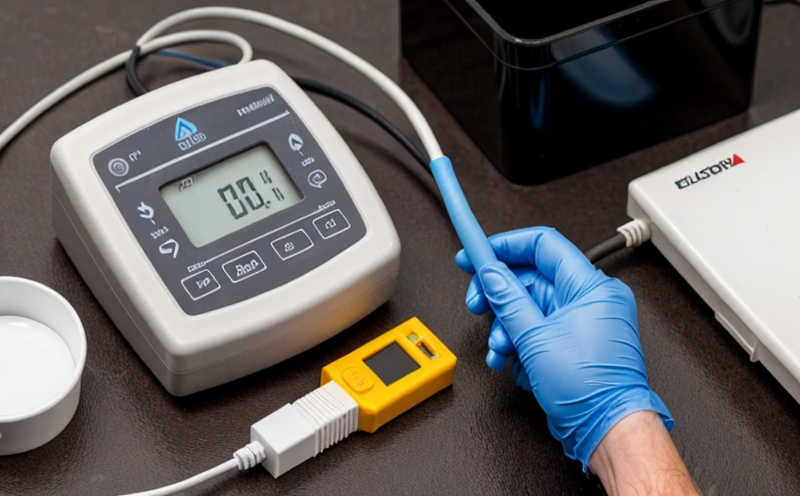ISO 21062 Electrochemical Testing of Thin Films
The ISO 21062 standard provides a framework for the electrochemical testing of thin films. This service is crucial in ensuring that thin film coatings meet specific performance criteria, particularly within sectors such as electronics, automotive, and aerospace.
Thin films are used extensively across various industries due to their unique properties like high conductivity, corrosion resistance, and thermal stability. Electrochemical testing serves to evaluate the integrity of these films under real-world conditions. The ISO 21062 standard ensures that tests are conducted in a consistent manner, allowing for reliable comparisons between different batches or manufacturers.
The process typically involves several steps including specimen preparation, solution selection, and data analysis. Specimen preparation is critical; it must accurately represent the thin film as it will be used in its intended application. Solutions used during testing should closely mimic those expected in the actual environment where the film will operate. Data analysis requires sophisticated software capable of interpreting complex electrochemical signals.
One key aspect of ISO 21062 is its emphasis on repeatability and reproducibility. This ensures that results obtained by different testers or laboratories are consistent. The standard specifies detailed procedures for each step of the testing process, from initial setup to final data interpretation.
The application of this service extends beyond mere compliance; it contributes significantly to product development cycles. By identifying potential issues early in the design phase, engineers can make necessary adjustments before large-scale production begins. This not only saves time but also reduces costs associated with recalls or rework.
Moreover, adherence to ISO 21062 helps manufacturers gain competitive advantages by demonstrating commitment to quality and reliability assurance. It allows them to enter markets where stringent regulatory requirements exist without compromising on safety standards.
Why It Matters
The importance of electrochemical testing cannot be overstated when it comes to ensuring the longevity and performance of thin films in various applications. Thin films are often exposed to harsh environments which can lead to degradation over time if not properly protected by an appropriate coating.
- Corrosion Resistance: In industries like automotive and aerospace, where metals are commonly used, thin film coatings play a vital role in preventing corrosion. Electrochemical testing helps ensure that these films provide adequate protection even under extreme conditions.
- Electrical Conductivity: For electronic components, maintaining optimal electrical conductivity is essential for functionality. ISO 21062 ensures that tests are conducted accurately to assess whether the thin film meets required specifications regarding conductivity.
- Tribological Properties: In mechanical systems where surfaces slide against each other (tribology), reducing friction and wear is crucial. Properly designed thin films can enhance tribological properties significantly, leading to longer component lifespans.
By incorporating electrochemical testing into their quality assurance processes, manufacturers demonstrate not only compliance with industry standards but also a proactive approach towards maintaining the highest levels of product integrity and performance.
Quality and Reliability Assurance
The role of ISO 21062 in enhancing quality and reliability assurance cannot be underestimated. The standard offers a robust methodology for evaluating thin film coatings, providing confidence that they will perform reliably under expected operating conditions.
Compliance with ISO 21062 ensures consistency across different batches or suppliers, which is particularly important when dealing with critical components like connectors in electronics assemblies or bearings in machinery. This uniformity helps prevent batch-to-batch variations that could otherwise lead to failures in end products.
Data generated from electrochemical testing can be used for predictive maintenance strategies. By monitoring changes over time, operators can anticipate when interventions may be needed before problems arise, thereby minimizing downtime and associated costs.
The standard also facilitates traceability throughout the supply chain. From raw material suppliers to final assembly plants, all parties involved in producing thin film coatings benefit from having standardized testing methods. This transparency fosters trust among stakeholders and supports continuous improvement efforts aimed at enhancing overall product quality.
Competitive Advantage and Market Impact
- Increased Efficiency: By identifying potential defects early in the production process, manufacturers can streamline operations leading to increased efficiency.
- Better Product Differentiation: Adherence to ISO 21062 allows companies to differentiate themselves through superior product performance and reliability.
- Enhanced Customer Trust: Demonstrating commitment to quality standards such as those prescribed by ISO 21062 builds trust with customers, enhancing brand reputation.
- Maintained Regulatory Compliance: Staying compliant with international standards ensures that products meet regulatory requirements, opening doors to new markets.
Incorporating ISO 21062 into your quality assurance strategy can provide significant competitive advantages. It not only enhances product performance and reliability but also supports sustainable business practices by encouraging continuous improvement.





